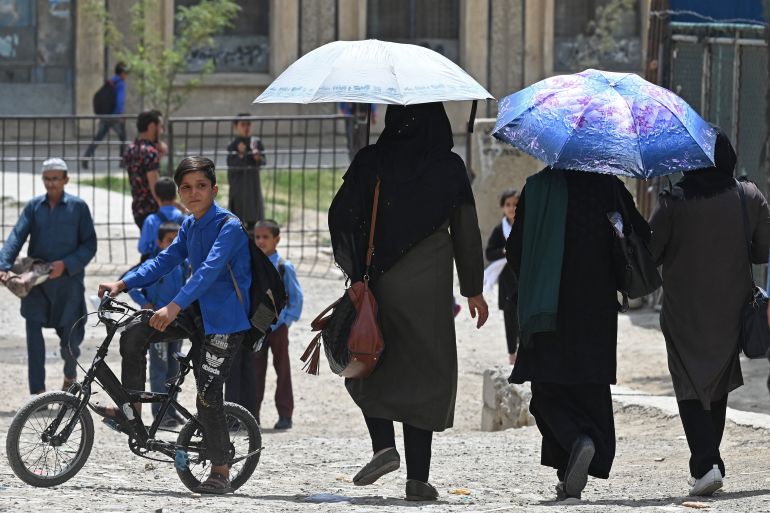Afghan universities reopen with small number of women attending
The Taliban has imposed many restrictions on women, but says it has no objection to education for women.

Some public universities have opened in Afghanistan for the first time since the Taliban seized power in August, with a trickle of women attending classes.
Most secondary schools for girls and all public universities were shuttered when the armed group stormed back to power, sparking fears that women would again be barred from education – as happened during the Taliban’s first rule from 1996 to 2001.
Keep reading
list of 4 itemsTwo women start eatery in Albania to help Afghans feel at home
Pakistan, Afghanistan pledge coordination on border crossings
Taliban killed dozens of former Afghan officials: UN report
Officials said universities in Laghman, Nangarhar, Kandahar, Nimroz, Farah and Helmand provinces opened on Wednesday.
The AFP news agency said that one small group of women, wearing full-body veils or burqa, entered Laghman University early on Wednesday.
A witness talking to the Reuters news agency in the eastern city of Jalalabad saw female students entering via a separate door at Nangarhar University, one of the large government universities opening this week.
Zarlashta Haqmal, who studies law and political science at Nangarhar University, told AFP “it’s a moment of joy for us that our classes have started.”
“But we are still worried that the Taliban might stop them.”
More were scheduled to resume operations elsewhere in the country later this month.
The men who attended – ferried to the campus in local taxis and buses – were dressed in traditional tunics known as shalwar kameez.
Attendance was very thin and Taliban fighters guarded the entrance, a tripod-mounted machine gun resting on a boom gate.
Most students declined to offer their thoughts on returning to class, with some saying they had been warned by authorities not to speak to the press.
Journalists were prevented from entering the Laghman campus and universities in other provinces.
Not enough women lecturers
The Taliban have said they have no objection to education for women, but want classes to be segregated and the curriculum based on its principles.
“We were told that the classes will be held according to the Sharia [Islamic] law,” Malik Samadi, a 23-year-old mathematics student told AFP.
“I hope that they keep all the courses, because society needs them.”
“Education is the foundation of a country,” said civil engineering student Munsefullah at Helmand University, expressing joy at returning to his studies.
Some were sad as many of their fellow students had fled when the Taliban seized power after the west-backed government of President Ashraf Ghani collapsed.
Some institutions like Laghman University faced a shortage of women teachers. The university had only one female teacher for about 270 female students.
University head Asmatullah Durrani said the board was now looking to “recruit more women” teachers.
Call for more support for lecturers
The United Nations Assistance Mission in Afghanistan (UNAMA) chief Deborah Lyons called for more “scholarship programmes and support” to lecturers now that the universities were opening.
The reopenings come a week after a Taliban delegation held talks with Western officials in Norway, where they were pressed on improving the rights of women to unlock billions of dollars in seized assets and frozen foreign aid.
The halting of aid has triggered a humanitarian crisis in Afghanistan, which has already been devastated by decades of war.
No country has yet recognised the new Taliban government, which has imposed several restrictions on women, including banning them from some government jobs.
The Taliban say all girls’ schools will reopen by the end of March.